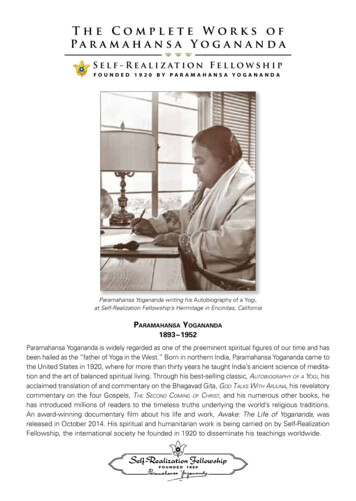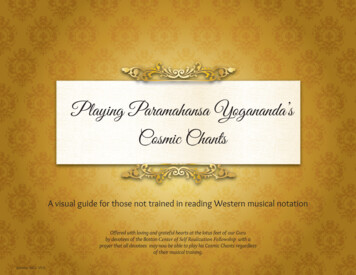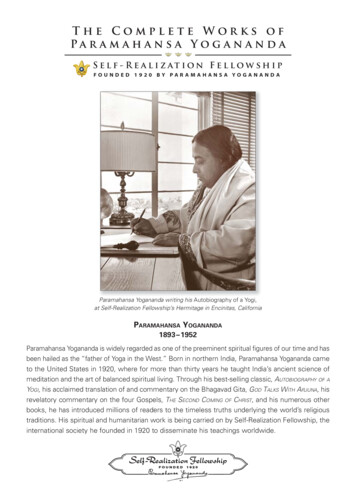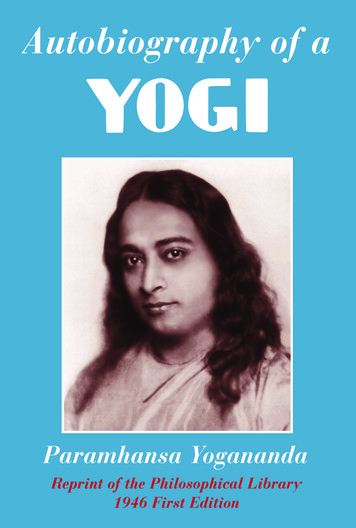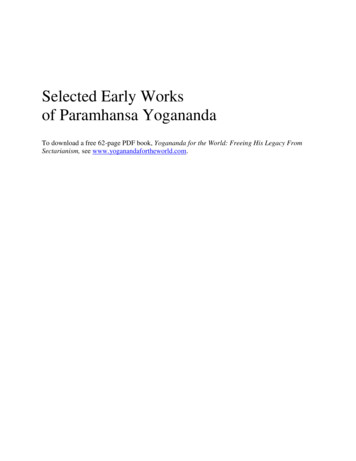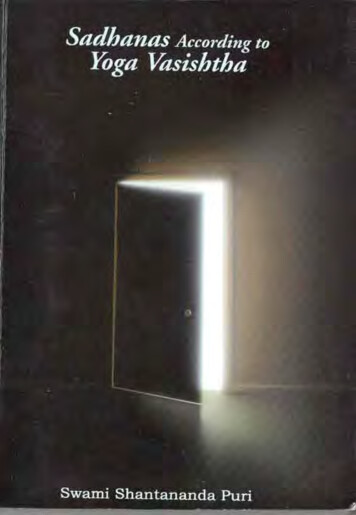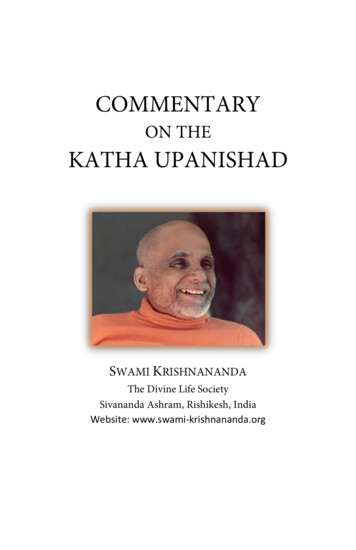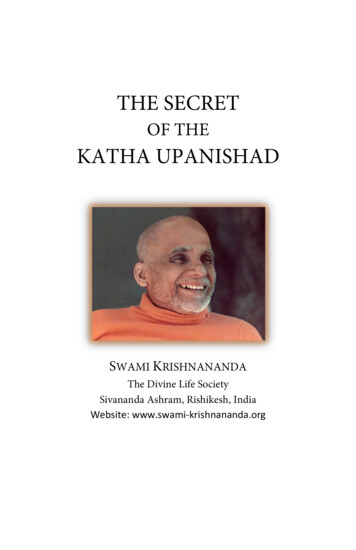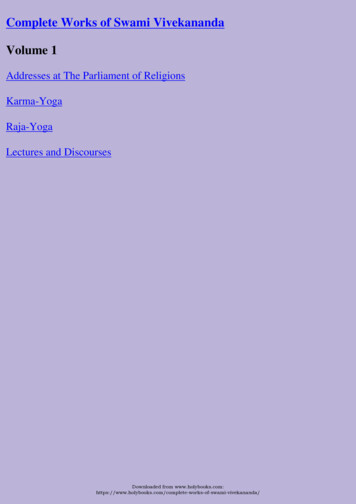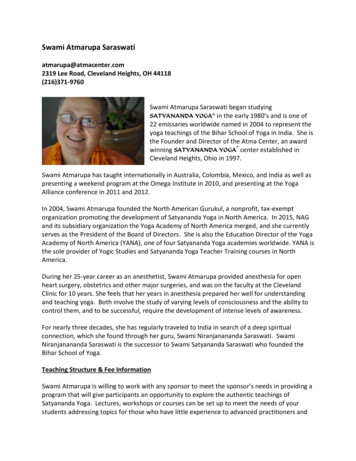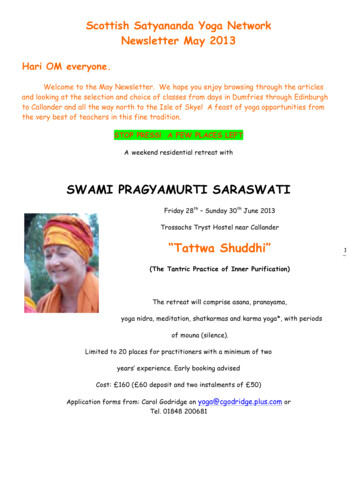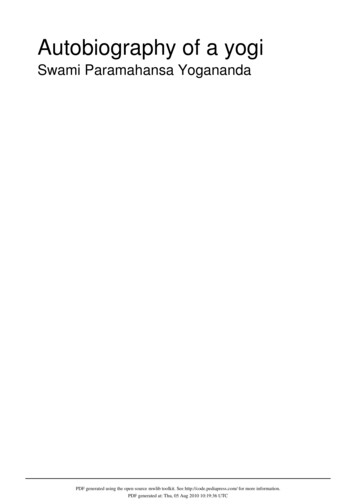
Transcription
Autobiography of a yogiSwami Paramahansa YoganandaPDF generated using the open source mwlib toolkit. See http://code.pediapress.com/ for more information.PDF generated at: Thu, 05 Aug 2010 10:19:36 UTC
ContentsArticlesAutobiography of a Yogi/Chapter 11Autobiography of a Yogi/Chapter 27Autobiography of a Yogi/Chapter 311Autobiography of a Yogi/Chapter 415Autobiography of a Yogi/Chapter 522Autobiography of a Yogi/Chapter 626Autobiography of a Yogi/Chapter 731Autobiography of a Yogi/Chapter 834Autobiography of a Yogi/Chapter 939Autobiography of a Yogi/Chapter 1042Autobiography of a Yogi/Chapter 1148Autobiography of a Yogi/Chapter 1253Autobiography of a Yogi/Chapter 1369Autobiography of a Yogi/Chapter 1473Autobiography of a Yogi/Chapter 1578Autobiography of a Yogi/Chapter 1684Autobiography of a Yogi/Chapter 1790Autobiography of a Yogi/Chapter 1893Autobiography of a Yogi/Chapter 1996Autobiography of a Yogi/Chapter 2098Autobiography of a Yogi/Chapter 21101Autobiography of a Yogi/Chapter 22106Autobiography of a Yogi/Chapter 23109Autobiography of a Yogi/Chapter 24113Autobiography of a Yogi/Chapter 25117Autobiography of a Yogi/Chapter 26120Autobiography of a Yogi/Chapter 27125Autobiography of a Yogi/Chapter 28129Autobiography of a Yogi/Chapter 29132Autobiography of a Yogi/Chapter 30134Autobiography of a Yogi/Chapter 31140Autobiography of a Yogi/Chapter 32145Autobiography of a Yogi/Chapter 33150Autobiography of a Yogi/Chapter 34154
Autobiography of a Yogi/Chapter 35160Autobiography of a Yogi/Chapter 36167Autobiography of a Yogi/Chapter 37172Autobiography of a Yogi/Chapter 38178Autobiography of a Yogi/Chapter 39181Autobiography of a Yogi/Chapter 40186Autobiography of a Yogi/Chapter 41190Autobiography of a Yogi/Chapter 42197Autobiography of a Yogi/Chapter 43205Autobiography of a Yogi/Chapter 44215Autobiography of a Yogi/Chapter 45224Autobiography of a Yogi/Chapter 46227Autobiography of a Yogi/Chapter 47233Autobiography of a Yogi/Chapter 48235ReferencesArticle Sources and Contributors240Image Sources, Licenses and Contributors241Article LicensesLicense242
Autobiography of a Yogi/Chapter 1Autobiography of a Yogi/Chapter 1Chapter 1: My Parents and Early LifeThe characteristic features of Indian culture have long been a search for ultimate verities and the concomitantdisciple-guru {FN1-2} relationship. My own path led me to a Christlike sage whose beautiful life was chiseled forthe ages. He was one of the great masters who are India's sole remaining wealth. Emerging in every generation, theyhave bulwarked their land against the fate of Babylon and Egypt.I find my earliest memories covering the anachronistic features of a previous incarnation. Clear recollections came tome of a distant life, a yogi {FN1-3} amidst the Himalayan snows. These glimpses of the past, by some dimensionlesslink, also afforded me a glimpse of the future.The helpless humiliations of infancy are not banished from my mind. I was resentfully conscious of not being able towalk or express myself freely. Prayerful surges arose within me as I realized my bodily impotence. My strongemotional life took silent form as words in many languages. Among the inward confusion of tongues, my eargradually accustomed itself to the circumambient Bengali syllables of my people. The beguiling scope of an infant'smind! adultly considered limited to toys and toes.Psychological ferment and my unresponsive body brought me to many obstinate crying-spells. I recall the generalfamily bewilderment at my distress. Happier memories, too, crowd in on me: my mother's caresses, and my firstattempts at lisping phrase and toddling step. These early triumphs, usually forgotten quickly, are yet a natural basisof self-confidence.My far-reaching memories are not unique. Many yogis are known to have retained their self-consciousness withoutinterruption by the dramatic transition to and from "life" and "death." If man be solely a body, its loss indeed placesthe final period to identity. But if prophets down the millenniums spake with truth, man is essentially of incorporealnature. The persistent core of human egoity is only temporarily allied with sense perception.Although odd, clear memories of infancy are not extremely rare. During travels in numerous lands, I have listened toearly recollections from the lips of veracious men and women.I was born in the last decade of the nineteenth century, and passed my first eight years at Gorakhpur. This was mybirthplace in the United Provinces of northeastern India. We were eight children: four boys and four girls. I,Mukunda Lal Ghosh {FN1-4}, was the second son and the fourth child.Father and Mother were Bengalis, of the KSHATRIYA caste. {FN1-5} Both were blessed with saintly nature. Theirmutual love, tranquil and dignified, never expressed itself frivolously. A perfect parental harmony was the calmcenter for the revolving tumult of eight young lives.Father, Bhagabati Charan Ghosh, was kind, grave, at times stern. Loving him dearly, we children yet observed acertain reverential distance. An outstanding mathematician and logician, he was guided principally by his intellect.But Mother was a queen of hearts, and taught us only through love. After her death, Father displayed more of hisinner tenderness. I noticed then that his gaze often metamorphosed into my mother's.In Mother's presence we tasted our earliest bitter-sweet acquaintance with the scriptures. Tales from theMAHABHARATA and RAMAYANA {FN1-6} were resourcefully summoned to meet the exigencies of discipline.Instruction and chastisement went hand in hand.A daily gesture of respect to Father was given by Mother's dressing us carefully in the afternoons to welcome himhome from the office. His position was similar to that of a vice-president, in the Bengal-Nagpur Railway, one ofIndia's large companies. His work involved traveling, and our family lived in several cities during my childhood.Mother held an open hand toward the needy. Father was also kindly disposed, but his respect for law and orderextended to the budget. One fortnight Mother spent, in feeding the poor, more than Father's monthly income.1
Autobiography of a Yogi/Chapter 1"All I ask, please, is to keep your charities within a reasonable limit." Even a gentle rebuke from her husband wasgrievous to Mother. She ordered a hackney carriage, not hinting to the children at any disagreement."Good-by; I am going away to my mother's home." Ancient ultimatum!We broke into astounded lamentations. Our maternal uncle arrived opportunely; he whispered to Father some sagecounsel, garnered no doubt from the ages. After Father had made a few conciliatory remarks, Mother happilydismissed the cab. Thus ended the only trouble I ever noticed between my parents. But I recall a characteristicdiscussion."Please give me ten rupees for a hapless woman who has just arrived at the house." Mother's smile had its ownpersuasion."Why ten rupees? One is enough." Father added a justification: "When my father and grandparents died suddenly, Ihad my first taste of poverty. My only breakfast, before walking miles to my school, was a small banana. Later, atthe university, I was in such need that I applied to a wealthy judge for aid of one rupee per month. He declined,remarking that even a rupee is important.""How bitterly you recall the denial of that rupee!" Mother's heart had an instant logic. "Do you want this woman alsoto remember painfully your refusal of ten rupees which she needs urgently?""You win!" With the immemorial gesture of vanquished husbands, he opened his wallet. "Here is a ten-rupee note.Give it to her with my good will."Father tended to first say "No" to any new proposal. His attitude toward the strange woman who so readily enlistedMother's sympathy was an example of his customary caution. Aversion to instant acceptance--typical of the Frenchmind in the West-is really only honoring the principle of "due reflection." I always found Father reasonable andevenly balanced in his judgments. If I could bolster up my numerous requests with one or two good arguments, heinvariably put the coveted goal within my reach, whether it were a vacation trip or a new motorcycle.Father was a strict disciplinarian to his children in their early years, but his attitude toward himself was truly Spartan.He never visited the theater, for instance, but sought his recreation in various spiritual practices and in reading theBHAGAVAD GITA. {FN1-7} Shunning all luxuries, he would cling to one old pair of shoes until they were useless.His sons bought automobiles after they came into popular use, but Father was always content with the trolley car forhis daily ride to the office. The accumulation of money for the sake of power was alien to his nature. Once, afterorganizing the Calcutta Urban Bank, he refused to benefit himself by holding any of its shares. He had simplywished to perform a civic duty in his spare time.Several years after Father had retired on a pension, an English accountant arrived to examine the books of theBengal-Nagpur Railway Company. The amazed investigator discovered that Father had never applied for overduebonuses."He did the work of three men!" the accountant told the company. "He has rupees 125,000 (about 41,250.) owing tohim as back compensation." The officials presented Father with a check for this amount. He thought so little about itthat he overlooked any mention to the family. Much later he was questioned by my youngest brother Bishnu, whonoticed the large deposit on a bank statement."Why be elated by material profit?" Father replied. "The one who pursues a goal of even-mindedness is neitherjubilant with gain nor depressed by loss. He knows that man arrives penniless in this world, and departs without asingle rupee."2
Autobiography of a Yogi/Chapter 1(MY FATHER, Bhagabati Charan Ghosh, A Disciple of LahiriMahasaya)Early in their married life, my parents became disciples of a greatmaster, Lahiri Mahasaya of Benares. This contact strengthened Father'snaturally ascetical temperament. Mother made a remarkable admissionto my eldest sister Roma: "Your father and myself live together as manand wife only once a year, for the purpose of having children."Father first met Lahiri Mahasaya through Abinash Babu, {FN1-8} anemployee in the Gorakhpur office of the Bengal-Nagpur Railway.Abinash instructed my young ears with engrossing tales of manyIndian saints. He invariably concluded with a tribute to the superiorglories of his own guru."Did you ever hear of the extraordinary circumstances under whichyour father became a disciple of Lahiri Mahasaya?"It was on a lazy summer afternoon, as Abinash and I sat together in thecompound of my home, that he put this intriguing question. I shook myhead with a smile of anticipation."Years ago, before you were born, I asked my superior officer-your father-to give me a week's leave from myGorakhpur duties in order to visit my guru in Benares. Your father ridiculed my plan."'Are you going to become a religious fanatic?' he inquired. 'Concentrate on your office work if you want to forgeahead.'"Sadly walking home along a woodland path that day, I met your father in a palanquin. He dismissed his servantsand conveyance, and fell into step beside me. Seeking to console me, he pointed out the advantages of striving forworldly success. But I heard him listlessly. My heart was repeating: 'Lahiri Mahasaya! I cannot live without seeingyou!'"Our path took us to the edge of a tranquil field, where the rays of the late afternoon sun were still crowning the tallripple of the wild grass. We paused in admiration. There in the field, only a few yards from us, the form of my greatguru suddenly appeared! {FN1-9}"'Bhagabati, you are too hard on your employee!' His voice was resonant in our astounded ears. He vanished asmysteriously as he had come. On my knees I was exclaiming, 'Lahiri Mahasaya! Lahiri Mahasaya!' Your father wasmotionless with stupefaction for a few moments."'Abinash, not only do I give YOU leave, but I give MYSELF leave to start for Benares tomorrow. I must know thisgreat Lahiri Mahasaya, who is able to materialize himself at will in order to intercede for you! I will take my wifeand ask this master to initiate us in his spiritual path. Will you guide us to him?'"'Of course.' Joy filled me at the miraculous answer to my prayer, and the quick, favorable turn of events."The next evening your parents and I entrained for Benares. We took a horse cart the following day, and then had towalk through narrow lanes to my guru's secluded home. Entering his little parlor, we bowed before the master,enlocked in his habitual lotus posture. He blinked his piercing eyes and leveled them on your father."'Bhagabati, you are too hard on your employee!' His words were the same as those he had used two days before inthe Gorakhpur field. He added, 'I am glad that you have allowed Abinash to visit me, and that you and your wifehave accompanied him.'"To their joy, he initiated your parents in the spiritual practice of KRIYA YOGA. {FN1-10} Your father and I, asbrother disciples, have been close friends since the memorable day of the vision. Lahiri Mahasaya took a definiteinterest in your own birth. Your life shall surely be linked with his own: the master's blessing never fails."3
Autobiography of a Yogi/Chapter 1Lahiri Mahasaya left this world shortly after I had entered it. His picture, in an ornate frame, always graced ourfamily altar in the various cities to which Father was transferred by his office. Many a morning and evening foundMother and me meditating before an improvised shrine, offering flowers dipped in fragrant sandalwood paste. Withfrankincense and myrrh as well as our united devotions, we honored the divinity which had found full expression inLahiri Mahasaya.His picture had a surpassing influence over my life. As I grew, the thought of the master grew with me. In meditationI would often see his photographic image emerge from its small frame and
PDF generated at: Thu, 05 Aug 2010 10:19:36 UTC Autobiography of a yogi Swami Paramahansa Yogananda. Contents Articles Autobiography of a Yogi/Chapter 1 1 Autobiography of a Yogi/Chapter 2 7 Autobiography of a Yogi/Chapter 3 11 Autobiography of a Yogi/Chapter 4 15 Autobiography of a Yogi/Chapter 5 22 Autobiography of a Yogi/Chapter 6 26 Autobiography of a Yogi/Chapter 7 31
